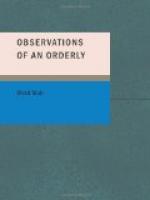Not all army slang is lacking, indeed, in a facetious irony. Miserable conditions in the desert or in the trenches, bad accommodation, doubtful food—anything which cannot arouse the faintest enthusiasm of any sort—these, in the lingo of our now much-travelled and stoical troops, are “nothing to write home about.” Surely there is an admirable spirit in this sarcasm. It crops up again in the hospital metaphor “going to the pictures.” That is Tommy’s way of announcing that he is to go under the surgeon’s knife, on a visit to the operating theatre. Again, there is a sardonic tang in the army’s condemnation of one who has been telling a far-fetched story: he has been “chancing his arm” (or “mit"). Similarly one detects an oblique and wry fun in the professional army man’s use of the word “sieda” to mean “socks.” (The new army more feebly dubs them “almond rocks.”) “Sieda” has been brought by the Anzacs from Cairo, and with them it means “Good morning!”—a mere friendly hail, now used with great frequency. But the veterans of older expeditions in Egypt and in India, when they had been on the march, took their socks from their perspiring feet and lay down to sleep; and in the morning—well, their socks said “Sieda!” to them when they awoke, and were christened accordingly.... Or again, the socks (or other property) might have vanished in the night—in which case there had been “hooks about” (pilferers about). If one of those “hooks” were caught, he would be first “rammed in the mush” (put in the guardroom), and then, if his guilt were established, he would be observed “going over the wall” or “going to stir” (going to the detention prison).
A few other slang words which I have come across in the hospital, and which seem to me to bear the mark of the old army as distinct from the new, are: “bondook,” a rifle; “sound scoff” (to the bugler, to sound Rations); “scran,” victuals, rations; “weighing out,” paying out; “chucking a dummy,” being absent; “get the wind up,” be afraid (and “put the wind up,” make afraid); “the home farm,” the married quarters; “chips,” the pioneer sergeant (carpenter); “tank,” wet canteen; “tank-wallah,” a drinker; “tanked,” drunk; “A.T.A. wallah,” a teetotaller (from the Army Temperance Association); “on the cot” or “on the tack,” being teetotal; “jammy,” lucky (and “jam,” any sort of good fortune); “win,” to steal; “burgoo,” porridge; “eye-wash,” making things outwardly presentable; “gone west,” died (also applied to things broken, e.g. a broken pipe has “gone west"); “oojah,” anything (similar to thingummy or what-d’ye-call-it); “push,” “pusher,” or “square push,” a girl (hence “square-push tunic,” the “swagger” tunic for walking-out occasions). The words for drunkenness are innumerable—“jingled,” “oiled,” “tanked to the wide,” “well sprung,” “up the pole,” “blotto,” etc.; but I smell the modern in some of these; their flavour is of London taverns rather than of the dusty barrack squares of India, Egypt, Malta, and Gibraltar.




